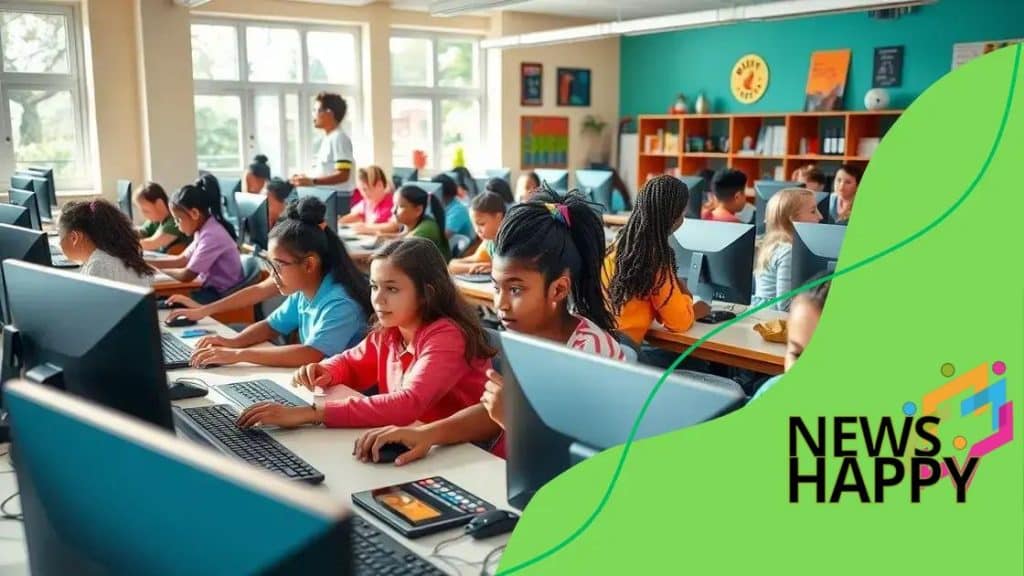How coding education is becoming essential in schools

Anúncios
Coding education is essential in schools as it equips students with vital problem-solving skills, fosters creativity, and prepares them for future careers in a technology-driven world.
How coding education is becoming essential in schools is more than just a trend; it’s a vital part of preparing students for their future. Have you noticed how quickly technology evolves? With coding, students gain valuable skills that enhance their creativity and critical thinking.
Anúncios
The importance of coding skills in the digital age
Understanding the importance of coding skills in the digital age is critical for every student. As technology continues to shape our world, coding becomes a fundamental skill, much like reading or math. Learning to code not only enhances computational thinking but also opens up a world of creativity.
Why Learning to Code Matters
First, coding skills help students develop essential problem-solving abilities. When faced with challenges, they learn to break down problems into manageable parts. This process fosters strong analytical skills.
Benefits of Coding Education
- Improves critical thinking
- Encourages creativity and innovation
- Prepares students for future job markets
- Fosters collaboration through group projects
In addition to boosting problem-solving skills, coding education fosters a creative outlet. Students express their ideas through technology by building applications or designing websites. This creative process ignites passion and enthusiasm, encouraging them to explore further.
Anúncios
Moreover, instilling coding skills at a young age gives students a head start in numerous career paths. Today, almost every industry requires some level of tech knowledge, making coding an invaluable asset.
As students learn coding, they engage with real-world applications. For example, they might build a simple video game or create an engaging website. These projects not only enhance their learning experience but also instill a sense of accomplishment.
Ultimately, emphasizing the importance of coding skills cultivates a generation of thinkers and innovators. Encouraging schools to incorporate coding into their curriculum prepares students for a technology-driven future, equipping them with the tools they need to succeed.
How coding classes boost problem-solving abilities
Coding classes are essential in enhancing students’ problem-solving abilities. These classes challenge students to think critically and creatively. When students code, they encounter various problems that require thoughtful solutions.
Developing Critical Thinking Skills
Through coding, students learn how to break down complex tasks into smaller, manageable pieces. This skill, known as decomposition, allows them to tackle problems more effectively. Each coding project provides an opportunity to practice analyzing issues and devising strategies to overcome them.
Steps to Improve Problem-Solving
- Identifying the problem clearly
- Breaking it down into smaller parts
- Testing possible solutions
- Reflecting on the process to improve
Additionally, students learn to test their solutions. They discover the importance of debugging, which involves finding and fixing errors in their code. This process teaches resilience and patience, as it often requires multiple attempts before achieving the desired outcome.
Furthermore, coding promotes collaboration when students work on group projects. They engage in discussions, share ideas, and provide feedback. This teamwork enhances their ability to think from different perspectives, leading to well-rounded solutions.
In a coding class, students might face a project requiring them to create a game or app. This challenge encourages them to implement logical thinking and strategize how to make their code function effectively. As they navigate through these tasks, their problem-solving skills naturally improve.
Ultimately, coding classes enrich students’ problem-solving abilities, preparing them for future academic and professional challenges. They become more confident in their ability to analyze and tackle issues creatively and effectively.
Integrating coding education into school curriculums

Integrating coding education into school curriculums is becoming increasingly important as we move further into the digital age. Schools around the world recognize that coding is not just for tech classes; it is essential across all subjects.
Benefits of Coding in the Curriculum
Coding promotes problem-solving, creativity, and critical thinking. By incorporating it into the curriculum, students can apply these skills in various contexts. For instance, learning to code helps students understand mathematical concepts better by visualizing problems through programming.
Approaches to Integration
- Incorporate coding into existing subjects like math and science
- Create standalone coding classes or workshops
- Utilize online platforms and resources for interactive learning
- Engage community partners for real-world projects
Furthermore, integrating coding into the curriculum allows students to work on real-life projects. They might build apps that solve local issues or create programs that embody their creativity. These hands-on experiences enrich the learning process and make coding more relatable.
Collaboration is another crucial element in this integration. Students can work together on coding projects, enhancing their teamwork skills while learning programming languages. This collaborative environment encourages peer support and information sharing.
Moreover, teachers need training to effectively integrate coding into their lessons. Professional development programs can equip them with the necessary tools and knowledge. This support ensures that coding is taught effectively and aligns with educational standards.
In summary, integrating coding education into school curriculums enriches student learning experiences. It equips them with essential skills for tomorrow’s workforce and inspires a passion for technology.
Real-world applications of coding for students
Exploring the real-world applications of coding for students highlights why coding is an essential skill. Today, technology surrounds us, and understanding how to code empowers students to engage with the digital world actively.
Coding in Everyday Life
Coding is not just a classroom activity; it’s part of our daily lives. From apps to websites, coding helps create the digital tools we use every day. By learning to code, students can understand how these tools function and even create their own.
Career Opportunities
- Software development
- Web design
- Game development
- Data analysis
Additionally, the job market shows a growing demand for coding skills. Many careers now require basic coding knowledge. For instance, fields in tech, healthcare, and finance benefit from coding, creating numerous opportunities for students who are skilled in this area.
Moreover, students can apply coding skills to solve real problems. For example, they can devise apps that address local community issues or automate tasks that save time. This application fosters innovation and encourages students to think critically about the challenges they observe.
Collaborative projects often highlight the real-world applications of coding. When students team up to build a website or create a game, they learn how to communicate effectively, share responsibilities, and bring their ideas to life. These experiences not only build their skills but also enhance their confidence.
In summary, recognizing the practical relevance of coding helps motivate students. As they see how their skills can make a difference, they become more engaged learners, ready to tackle future challenges.
Success stories from schools embracing coding education
Success stories from schools embracing coding education provide inspiring examples of how coding transforms education. Many schools are integrating coding into their curriculums, leading to improved student engagement and skill development.
Case Study: A Local High School
One notable example is a high school that introduced coding classes as part of its curriculum. Students learned programming languages like Python and JavaScript. As a result, they created web applications that addressed community issues, such as food waste and recycling. This hands-on approach not only taught them valuable coding skills but also sparked their interest in technology careers.
Engaging Students Through Competitions
- Hosting coding competitions
- Creating clubs focused on tech projects
- Partnering with local businesses for mentorship
- Participating in national coding challenges
Another school successfully engaged students by hosting coding competitions. These events encouraged collaboration and creativity. Students formed teams, tackled coding challenges, and presented their projects. Such experiences motivated students to deepen their coding skills while fostering a strong sense of community within the school.
Moreover, schools that embrace coding education often see increased participation in STEM (Science, Technology, Engineering, and Mathematics) fields. By exposing students to coding concepts early on, they develop a passion for technology, paving the way for future studies and careers in high-demand areas.
Additionally, parents and teachers report that students who participate in coding programs exhibit higher confidence levels. They become more adept at problem-solving and critical thinking, skills essential in today’s job market. When students realize they can create and innovate, their enthusiasm for learning grows.
Highlighting such success stories showcases the profound impact of coding education on students and fosters a greater understanding of its importance in modern education.
FAQ – Frequently Asked Questions about Coding Education in Schools
Why is coding education important for students?
Coding education is vital as it empowers students with problem-solving skills, creativity, and prepares them for future career opportunities in a tech-driven world.
How can schools successfully integrate coding into their curriculums?
Schools can integrate coding by creating dedicated coding classes, incorporating coding into existing subjects like math and science, and offering after-school coding clubs.
What are some benefits of coding competitions for students?
Coding competitions encourage collaboration, critical thinking, and creativity, allowing students to work together and gain hands-on experience while boosting their confidence.
How can coding help students with real-world problems?
Through coding, students can create applications or programs that address local issues, enhancing their understanding of technology and its practical applications.





